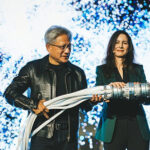Study programme for quantum programmers opens in Copenhagen Science City
Tomorrow’s tech needs tomorrow’s talent. Quantum computers are very close to becoming a reality and over the past two years, demand for people with quantum qualifications has skyrocketed. To fulfil the massive demand from companies, Copenhagen Science City-partner University of Copenhagen has established a two-year M.Sc. programme to educate essential personnel for the quantum revolution. The new study programme will accept applications from January 1st 2023. By Jes Andersen.
The new interdisciplinary study programme will train some students to dive deeper into theory and develop algorithms and quantum software, while others will take a closer look at quantum hardware and how these technologies can be applied by companies. The programme will be anchored at University of Copenhagen Department of Mathematical Sciences. It will be provided in collaboration with the university’s departments of physics and computer science as well as with Danish Technical University DTU.
Birthplace of quantum still a global hotspot
Copenhagen’s Niels Bohr Institute was the birthplace of quantum science and 2022 has proven that Copenhagen Science City is still a global hotspot. In April 2022 NATO unveiled plans to establish a quantum technology test- and commercialisation centre in the innovation district. In October the Novo Nordisk Foundation published their decision to fund a quantum research centre at Copenhagen Science City-partner University of Copenhagen to the tune of 1,1 billion DKK complemented by 400 million DKK for a quantum engineering and production facility.
Profound impact
According to business magazine Forbes, quantum computing will have a profound impact on financial services, logistics, transportation, aerospace and automotive, materials science, energy, agriculture, pharmaceuticals, healthcare, and cybersecurity.
Quantum technologies can already do things that our classical computers can’t. But in 50 to 100 years, it will have transformed the way we think about a great many things”: Jan Phillip Solovej, professor, QMATH and head of studies, UCPH MSc programme in Quantum Science
A race for nations
Quantum technologies will have huge strategic implications and countries around the world have entered the race to achieve quantum dominance. According to McKinsey, the European Union alone have announced plans to spend 7.2 billion Euro in public funding on quantum while China has pledged 15 billion Euro.
Private players from all tech verticals
Private companies have also entered the race to achieve quantum supremacy, and they come from all fields.
- BMW (Transportation)
- ExxonMobil (Energy)
- FedEx (Logistics)
- JPMorgan (Finance)
- Merck (Chemistry)
- Roche (Pharmaceuticals)
Opens in early 2023
The MSc programme in Quantum Science will open for applications on 1 January 2023. The programme is initially expected to have 25 slots open for new students.




